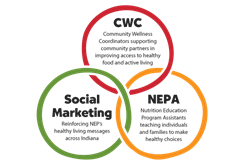What Do Our CWCs and NEPAs Do?

The Purdue Extension Marion County office has three Community Wellness Coordinators (CWCs) and various Nutrition Education Program Advisors (NEPAs) that we are fortunate to work with. You may have heard of CWCs or NEPAs, but do you know who are they and what they do? Read below to learn more about these hardworking individuals!
What do CWCs do? What does a "day in the life" look like for you?
As a Community Wellness Coordinator (CWC) it is our job to make the healthy choice the easy choice for the residents of Marion County. We do this through community-led initiatives such as community gardens, farmers' markets, school and workplace wellness, assistance with the Supplemental Nutrition Assistance Program (SNAP), and much more. Our focus is on improving access to nutritious foods and safe places to be physically active in low-income areas.
Each day as a CWC is different and most of our time is spent away from the office. One day we could be out at a community garden helping to come up with a sustainability plan and the next day we could be hosting a community meeting to determine new projects.
What do NEPAs do?
A Nutrition Education Program Advisor or NEPA works directly with the community to improve nutrition, food safety, physical activity, food security, and food resource management. This is done through a series of FREE educational classes for youth and adults through schools and various community organizations. A good analogy to help understand the difference between a CWC and a NEPA is that a NEPA teaches about fruits and vegetables; why they are good for you, how to shop for them affordably, and how to prepare them. A CWC helps people tackle hurdles they run into, such as lack of transportation (no sidewalks or bus routes) or the fact that there isn’t a store that sells fresh produce in the area.
How do you become a NEPA? What kind of training do you do to become a NEPA?
To become a NEPA, all you need to do is apply. A background in nutrition or education can be helpful but is not a requirement. You must be motivated, able to work independently, and passionate about working with people with limited resources. NEPAs receive training on nutrition curriculum and other nutrition and physical activity topics to keep up to date on current trends.
How do NEPAs and CWCs work together?
NEPAs provide valuable knowledge to enable community members to make the healthiest choices and CWCs make sure the community members are able to put that knowledge into practice. We work together a lot to share contacts and areas where there is a need for education or intervention.
What are some resources that NEPAs and CWCs can offer to the community?
NEPAs are able to offer a variety of free classes and programming to various age groups in the community and CWCs offer capacity building and coordination to help implement community projects that make living healthy easier.
How did you respond to COVID? How have your practices/services been impacted?
Like most people, our meetings and programs moved to online platforms and we had to get creative to stay connected to our communities!
Learn More About Our CWCs
Kristen Fitzgerald - fitzger3@purdue.edu
Where did you go to college?
Purdue University
What do you focus on, individually, as a CWC?
A lot of my work as a CWC focuses on Supplemental Nutrition Assistance Program (SNAP) access in the small retail and farmers' market settings, school wellness, and coalition building.
How long have you been a CWC?
I have been a CWC for 5 years.
What is the best/most memorable moment you have from working as a CWC?
I recently helped a public school create an indoor walking path that included physical activity stations and interactive sensory pathways and I visited the school while it was being used as a polling location and was able to see my work displayed!
Cori Chatterton - cchatter@purdue.edu
Where did you go to college?
Purdue University
What do you focus on, individually, as a CWC?
Most of the work I've done as a CWC has been focused on emergency food relief/food resource management and working with coalitions to expand trail systems and safe places to be physically active.
How long have you been a CWC?
A little over a year and a half-- It'll be two years in June!
What is the best/most memorable moment you have from working as a CWC?
I have met some incredible community members during food box distributions and our conversations are some of my favorite memories from this position
Linda Adams - adams284@purdue.edu
Where did you go to college?
Purdue University
What do you focus on, individually, as a CWC?
I try to remain connected to the community in such a way that I can jump in and help when there is an opportunity to open up doors to make it easier to for limited-resource people to obtain healthy food or take advantage of opportunities to add physical activity to their day.
How long have you been a CWC?
I have been a Community Wellness Coordinator for five years, all of it here in Marion County.
What is the best/most memorable moment you have from working as a CWC?
There have been several moments that have brought me pride, but I was especially pleased with my efforts to work with Southside food pantries to set up a HATCH for hunger delivery spot enabling 8 food pantries to acquire eggs packaged by the dozen to share with their clients. This partnership enabled food pantries to offer their clients high-quality protein on a consistent basis, which proved to be particularly important during the COVID-19 shutdowns and food shortages.